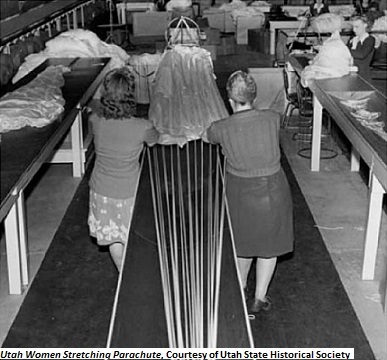Dublin Core
Title
Description
You’ve seen her. She wears the red bandanna and a blue collared shirt, flexing her bicep with a look that says, “get to work.” She’s Rosie the Riveter, and Utah had an army of them.
When American men deployed to the front lines during World War II, American women labored on the homefront in support of the war effort. In Utah, women found work at Fort Douglas, Hill Air Force Base, and other military facilities, such as the C.F. Fauntleroy Parachute Company in Manti. Fauntleroy manufactured parachutes for the armed forces and helped the struggling local economy by employing hundreds of women as sewers, inspectors, and supervisors.
Some in Utah believed that women should not do wartime production work. In 1942, for example, an LDS Church Relief Society official counseled that, “This Mother’s Day should find the mothers of the Church… at home, devoting their energies to the proper upbringing of… children as their most patriotic gesture in the war.” A Utah State Training School psychologist also warned that war jobs for women would produce “a new independence” and that women earning higher wages than their husbands would result in fathers sharing “motherly functions.” The LDS Church’s First Presidency chimed in by telling mothers that leaving their children to answer the call of wartime “civic service” would lead to motherly “shame.”
Yet workers at the Fauntleroy Parachute Company found their consistent paychecks to be crucial for their families. And even as Fauntleroy workers earned wages, they continued to do a full-time unpaid job at home. The days were long and difficult. One worker recalled that, “We started at eight o’clock in the morning, and I was glad to get home after work.” But it was then that the second shift began. Women had to “fix dinner, scrub on the board, [and] iron,” as well as “stay up till midnight to get things done at home.” Many helped look after the children of their neighbors who worked different shifts at the factory.
Utah’s Rosies stepped up for the nation, even as they kept the homefires burning. When the war ended, most of the women who worked for Fauntleroy’s parachute factory – just like most Rosies across the country – lost their well-paid wartime production jobs.
Creator
Matthew Basso for Utah Humanities © 2017
Source
________________
See Amanda Midgley Borneman, “Mormon Rosies: Women and War Work in Manti,” Journal of Mormon History 36, no. 1 (2010), pp. 73-92.

